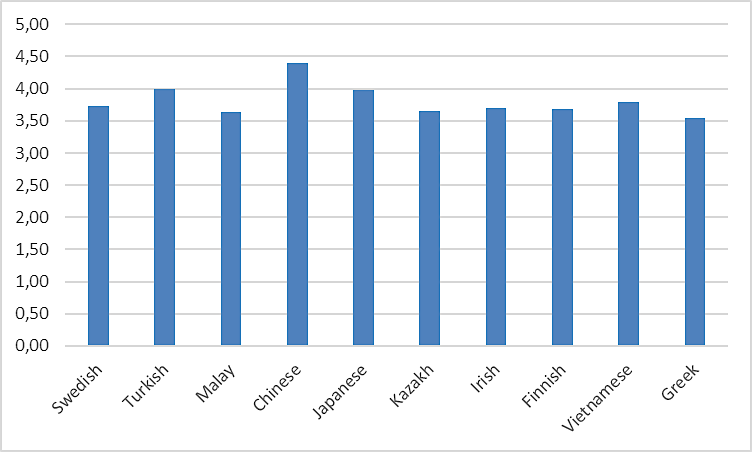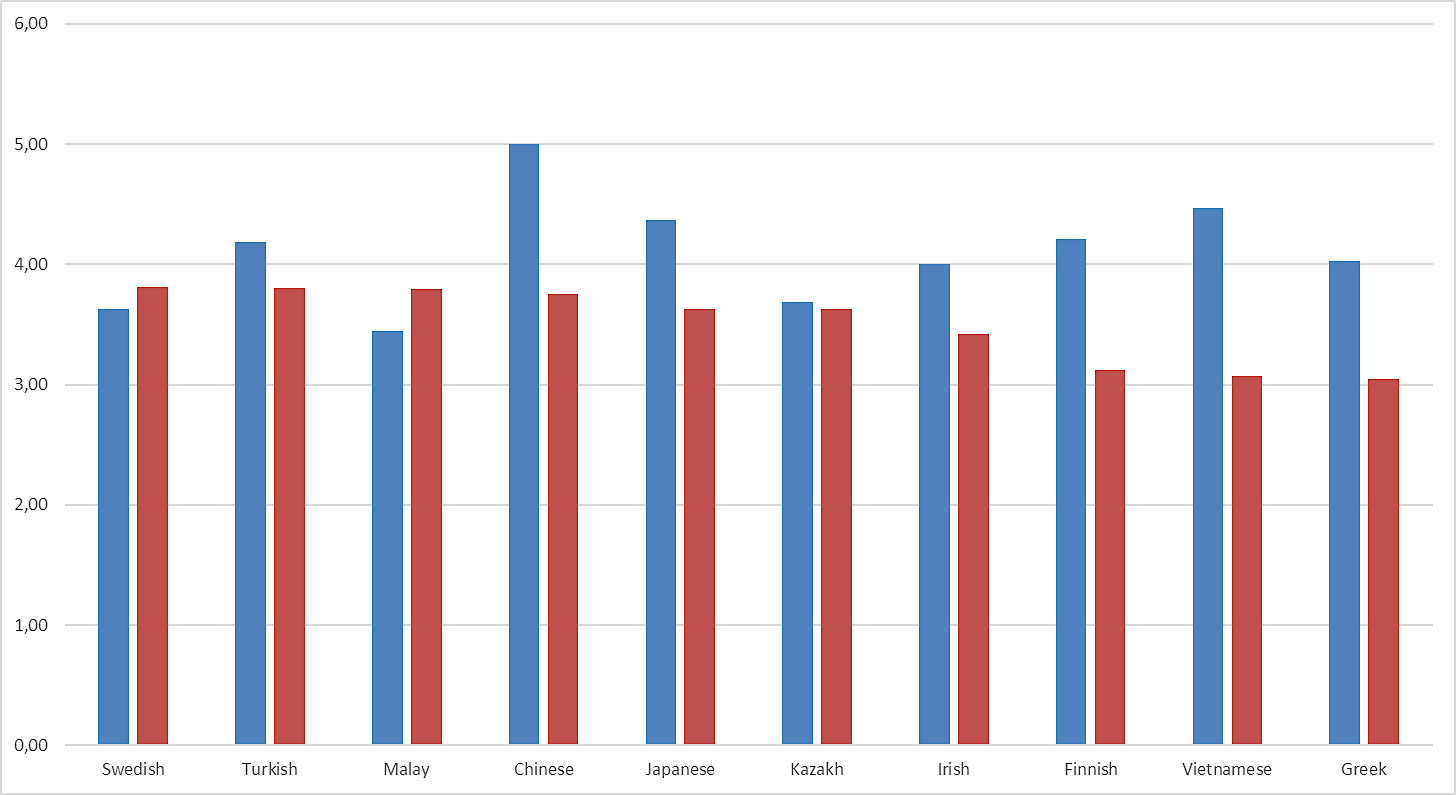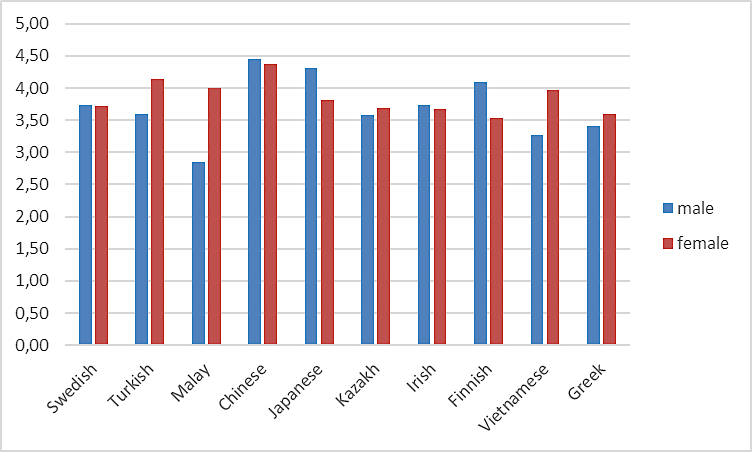Abstract
There are a lot of general aspects impacting the sphere of foreign language teaching, there are also numerous references to them. However, the sphere of perception of foreign languages is rather neglected. Perception is thoroughly studied by psychology; there are numerous studies of visual and tactile perception. But the research in perception of heard information given in a foreign language is insufficient. Such a kind of research deals with a subjectively tinged and interdisciplinary phenomenon. The text presents so far gained results of our research which focuses on ways in which various foreign languages are perceived by learners aged 12-14. The aspects which have direct or indirect impacts on perception of foreign languages are listed. These aspects are inextricably linked with the sphere of foreign language teaching. If an individual perceives a foreign language negatively, s/he cannot be expected to have a positive attitude to learning it. The first factors perceived by an individual hearing a foreign language are usually the speech melody, intonation and rhythm. The contents of the heard text are focused on in a later phase since certain linguistic knowledge of the grammar system of the target language is needed. So far we have not revealed all the factors impacting the perception of different languages. However, we believe that the presented results of our research will be fruitful and will help to fill in the existing gaps in this research sphere.
Keywords: Perceptionforeign languagemelodyFLTcognitive learning
Introduction
Perception can be defined in several possible ways. According to Průcha, Walterová and Mareš (2009), it is a process of acquiring and processing of stimuli and information constantly coming from the surrounding and internal world of human beings. Nakonečný (2003) claims that the centre of perception is the brain and the perception process is mediated by activities of sensory organs and commemorated images and events. According to Atkinson, Atkinson, Smith, Bem and Nolen-Hoeksema (1995), a holistic perception of the surrounding world is a result of the perception process. In their publications, a majority of psychologists focus on visual and tactile perception or perception of tastes and motions. There is an insufficient number of psychological publications focused on auditory perception. However, in the music sphere, the research into the issue of perception is larger. Jäncke (2012) defines perception as a sum of consecutive steps – those of recording, interpreting, selecting and organizing of sensory information. Referring to auditory perception, there are a lot of questions which have not been answered. Altenmüller (2018) mentions the following dispute of the 1980s concerning the location of the perception process in the human brain – the Holists claimed that the human brain is an integral organ working as a network; the Localizationists, on the contrary, claimed that e.g. perception of melody is clearly located in the cerebral cortex.
All acoustic features of tones (frequency, intensity, time length, tone spectrum) are reflected in an individual´s mind as music perceptions. Through application of electroacoustic methods, it has been revealed that the final reflection is not exactly equivalent to the acoustic composition of the tones since the tones are distorted and transformed in an individual´s auditory analyser (Sedlák & Vánová, 2013). According to Pulvermüller (2002) music and harmonic phenomena are processed in special locations of the left hemisphere of the brain. The Broca-Areal, which is the most significant for human speech, is also located in the left hemisphere. Altenmüller (2018) proved through his research that the spatial overlapping of neural substrates which appears in speech processing and in music processing makes us come to the conclusion that there are no merely simple and simply isolated ´music´ and ´speech´ centres.
The perception of (foreign) languages is linked with the perception of their melody. Melody is thus an important linguistic factor, and it is also one of the most significant means of music expression. From the music point of view, melody is usually defined as a sequence of tones of different height which are organized in a musically logical unit. From the linguistic point of view, melody is one of the basic prosodic means of language, and it refers to changes of tones in the speech process. Thus, the connection between music and language really exists. Patel (2008) adds that speech intonation is given priority and the focus is placed on what modern research in intonation suggests about connections with music. We can claim that melody is a form arranged according to music and linguistic rules. Melody is also organized in time; music rhythm and language rhythm are significant features. It is important to mention the fact that the melody of a language is an important phenomenon through which the language can be characterized.
Problem Statement
One of interesting spheres of the research in (foreign) languages is the relation between language and thinking. But the research in the sphere of perception of (foreign) languages is quite limited. Perception of foreign languages is a purely subjective issue of every individual, and it is connected with other numerous factors which play important roles in the process of learning foreign languages. According to Sternberg (2002), perception is a set of processes whose sources are stimuli from the environment and through which we explore, organize and understand the surrounding environment. Thus, we suppose that in the core of the perception of a foreign language there are auditory perceptive abilities. Thanks to these abilities, we perceive the language (similarly we perceive music), we distinguish linguistic constructive elements and understand their relations, we recognize familiar language phrases and we classify the precision of their performance. The hearing ability is thus the fundamental phenomenon of linguistic activities.
Motivation towards learning of a particular foreign language is another important aspect impacting the perception of the given language. According to Nakonečný (2003), the goals of an individual’s behaviour are set by motives, i.e. by his / her psychological reasons. Motivation in the sphere of learning of foreign languages controls an individual´s behaviour with the aim to learn the target foreign language. The psychological motives are in this case aimed at meeting the need of making oneself understood in the target foreign language. In the sphere of learning foreign languages, there are two kinds of motivation: a) internal motivation – an individual meets his/her own needs (e.g. a need to learn a foreign language), and b) external motivation – caused by an external stimulus (a punishment threat or a chance to be awarded or praised). And according to Lachout (2018) those induce or encourage humans to a certain behaviour, labour, endeavour or activity, and are usually positive in nature. It is a desirable impulse in motivation.
Motivation plays quite an important role in the sphere of teaching and learning of foreign languages. Intelligence and talents are other important factors. Intelligence is an essential characteristic feature of a personality; it refers to a) the ability of learning from experience, and b) adapting to the environment (Sternberg, 2002). Already in 1983, Howard Gardner (1999) proposed a new way of subdividing intelligence into the following types: linguistic, logical-mathematic, music, visual-spatial, kinaesthetic, interpersonal, intrapersonal and natural. For our purposes and for the sphere of foreign language teaching, linguistic intelligence is the most significant. According to Howard Gardner, language or linguistic intelligence refers to a human being´s abilities to understand both the spoken and written forms of a language for reaching specific objectives. This intelligence is linked with the abilities of abstract thinking and problem solving.
Another significant aspect which impacts perception of foreign languages is memory. The issue of memory has been researched by experts in the sphere of psychology (Sternberg, Nakonečný), linguistics (Lachout, Ondráková), methodology of foreign languages (Besedová, Tauchmanová) etc. Memory is important for the development of all mental abilities. It is also a key learning factor since the experience gets coded and stored in the brain and can be recalled later if necessary. According to Besedova (2018) referring to music and foreign language learning, the process of acoustic coding is applied; i.e. the heard information gets coded in the memory. To keep the information in our memory, we use the strategy of repetition. Atkinson et al. add (1995) that repetition is a very popular strategy in the process of teaching foreign languages – a teacher presents a word or a word phrase and the learners repeat these expressions after the teacher. The role of memory is quite complex in foreign language learning – sometimes the short-time memory is involved (remembering specific words or phrases), sometimes the long-time memory is involved (remembering a text in a foreign language for a long time period). Memory is intensively discussed by cognitive psychologists.
Prejudices belong to other aspects impacting perception of foreign languages. Prejudices are opinions which are not based on reliable cognition but which are based on a mere supposition. Prejudices can be quite influential in case of foreign languages since they can concern specific persons, specific groups or races of people, specific cultural or social institutions, etc. There are both positive and negative prejudices. Generally, it can be claimed that the reality is usually distorted by prejudices. Discussing the issue of prejudices, there is another factor worth mentioning, so called interlanguage. This specific language appears and constantly changes in the process of learning foreign languages as a result of language interference. The importance of this issue is stressed by Ondrakova and Tauchmanova (2019): “One of the current issues which definitely cannot be ignored by foreign language teachers is that of their learners’ transferring mistakes from other foreign languages which were being learnt by them before. The awareness of this issue is important for both learners and teachers“ (p. 358). Another example of a negative connotation is German as second foreign language by Heinrichova (2017), which is often associated with prejudices that are linked to one of the darkest chapters of human history, the period of national socialism. For this reason, pupils in the Czech Republic often choose a second foreign language other than German. The popularization of German and the elimination of this prejudice is contributed by the authors of contemporary German literature after 2000, who detabuise this historical theme with a whole range of new, yet untreated, aspects. Their work thus contributes to the elimination of stereotypes associated with Germany and the German language.
The issue of perception of foreign languages has not been sufficiently researched. This issue is linked with numerous other aspects; it is a really interdisciplinary issue which has to be studied from more angles and points of view. Experts from more spheres need to cooperate when researching perception of foreign languages. Opinions of medical doctors (physiology of perception), musicians (perception of melody, rhythm and intonation), teachers, psychologists (perception, information psychology, cognitive psychology, psychology of learning, memory) and linguists (determination and characterization of individual languages) have to be taken into consideration.
Research Questions
Doing research into perception, scientists make more and more intensive efforts to become aware of the kinds of the issues which are sorted out by our perception system. Visual perception has been studied quite thoroughly by psychologists, the research into auditory perception is much more limited. That is why we have studied varied theories of visual perception to get inspiration for our research. We have adjusted these theories and applied them when doing research into auditory perception. The most important aspect of auditory perception of foreign languages is the perception of the melody of the language. That is why our main research question was: “Do children aged 12-14 perceive foreign languages differently?”
Melody as one of the most important means of music expression is generally defined as a sequence of tones of different heights organized into a musically logical unit. Every human language has its characteristic sentence melody. This melody is frequently linked with the sentence stress which is mostly accompanied by a rising tone. This phenomenon attracted our attention. We decided to do research into subjective perception of foreign languages. Being aware of a high level of subjectivity and of numerous impacting aspects, we formulated our hypotheses quite carefully.
During our research we made efforts to confirm our following hypotheses:
Children aged 12-14 usually perceive foreign languages in a positive way.
Gender differences are quite tiny if not negligible in the sphere of perception of foreign languages.
Individuals who have been trained in music perceive tonic languages more positively than individuals without music education.
Indo-European languages are perceived by children aged 12-14 more positively than other languages.
Purpose of the Study
Perception of a foreign language is, in our opinion, a purely subjective issue of every individual. Perception is a central psychical phenomenon and it is a kind of foundation for human knowledge. Various kinds of perception have been so far researched by psychologists. There are numerous scientific publications referring to the sphere of auditory, tactile and spatial perception. The sphere of the perception of tastes has been researched by both psychologists and medical doctors. As it was already mentioned above, cooperation of medical doctors, physicists and psychologists is needed to research auditory perception. Through the oscillation of source elements and the following spread of the resulting waves into the surrounding environment, sounds can be heard. Due to a unique structure of every individual´s ears, sounds are perceived subjectively and differently.
For our purpose, i.e. for the purpose of our research into perception of foreign languages, we focused on the issue of ways in which individuals perceive foreign languages and on the issue of factors impacting this perception. In 2016, a research team was established at the Faculty of Education of the University of Hradec Kralove (Czech Republic). This research team studies the impact of music onto learning and teaching of foreign languages. Numerous partial studies have been done and published since 2016; these studies reveal a close connection between music and learning of foreign languages. The members of the research team who focus on perception of foreign languages are professional cognitive psychologists, teachers, musicians and linguists. These experts decided to carry out this presented research study whose objective is to reveal factors which impact school children´s perception of foreign languages. The issue of existing and non-existing formal education in music was also involved in the presented study. One of the aims of the study is to evaluate the differences in perception of foreign languages. The text presents only partial results of our long-term research.
Research Methods
The research was carried out in several phases, and it applied several research methods. Our main research method was a questionnaire which was completed by the respondents before the listening test. The questionnaire was of a non-standardized type with structured polytomic items of a multiple choice; the Likert type of the scale was applied. The questionnaire consisted of three parts: the first part asked about personal information, the second part focused on the respondent´s relation to music, and the third part focused on the respondent´s relation to foreign languages. The research sample consisted of pupils of lower secondary schools (aged 12 – 14). The total number of the respondents was 165 (48 ♂ and 117 ♀). This text presents partial results of our questionnaire survey, and it does not present the research data which are irrelevant for the purpose of this study.
Another research method applied was that of a listening test. 25 recordings of different foreign languages were made, the best ten out of them were used. The basic requirement imposed on the recordings was the ideally 100% comprehensionability and a minimal distortion of the real speech. Each of our recordings was adjusted – the background and impulse noises were removed, so called dialogue filter was applied to reach as high comprehensionability as possible, the dynamics of the recordings was adjusted, and, finally, each recording was normalized to the maximum -3 dBFS level, which assured a comparable acoustic perception (see Figure

The following foreign languages were listened to by the respondents: Kazakh, Turkish, Malay, Vietnamese, Danish, Greek, Swedish, Japanese, Chinese, Finnish. These ten languages were subdivided into two sequences, either containing five languages:
Sequence 1: Greek, Turkish, Chinese, Finnish, Vietnamese
Sequence 2: Danish, Japanese, Kazakh, Swedish, Malay.
Each respondent expressed his / her subjective opinion on just one set of five selected languages. The first sequence was listened to by 84 pupils; the second sequence was listened to by 81 pupils of lower secondary schools. The size of the groups can be considered as statistically comparable.
To record the respondents’ answers, the answer sheet was designed into which the respondents gave their answers concerning their perception of particular foreign languages. The method of the semantic differential was used for measuring the intensity of the respondents´ psychological attitude to a foreign language perception. The scale from 1 (the language is pleasantly engaging) to 7 (the language is irritating) was applied (see Figure

The collected data were first processed in the MS Excell Program, then contingent tables and resulting graphs were made. The IBM SPSS Statistics 24 was used for calculating of descriptive statistics and comparative statistics of the perception of individual languages.
Findings
Within the framework of our study, we established several hypotheses to be confirmed or refuted. In Table
Our hypothesis claiming that Indo-European languages are perceived by children aged 12-14 more positively than languages outside this language group can be neither confirmed nor refuted. Only three Indo-European languages were tested (Swedish – Median of 3.73, Irish – Median of 3.69, Greek – Median of 3.55), and they were perceived quite positively. However, we cannot clearly claim that Indo-European languages are generally perceived more positively since our research sample was relatively small in the given research phase and the number of only 3 Indo-European languages is not statistically significant.

In this phase, our hypothesis claiming that “individuals trained in music perceive tonic languages more positively than individuals without music education“ can be discussed. Looking at Figure

Our last hypothesis referred to gender differences in perception of foreign languages. We supposed that these differences would be really minor if not negligible. This hypothesis was only partly confirmed. As the above given Table
Table

The results of our research confirmed that perception of languages is a highly subjective issue, and that different individuals perceive languages differently. Moreover, there are numerous aspects impacting our perception of languages. Within the framework of our research, we focused merely on the factor of perception of foreign languages. However, other aspects have to be researched so that we can get better understanding of the phenomenon.
Conclusion
The issue of perception of foreign languages includes numerous factors and aspects which are of a significant importance and impact. The factors of auditory perception and subjective physiological hearing (every individual perceives sounds and melody in a different way) are the most significant ones. Male beings perceive melody differently from female beings; learners who have been trained in music perceive melody differently from learners who have not been trained in music. Another aspect significant for the perception of foreign languages is motivation towards learning foreign languages. It is quite obvious that a learner positively motivated for learning a particular foreign language perceives that language more positively. This aspect is also linked with prejudices appearing in the sphere of foreign languages. Having gained any negative experience with a particular foreign language, and/or its users, an individual learner is negatively motivated for the learning process and his/her perception of the language can be expected to be rather negative. Other aspects significant for perception and learning of foreign languages are intelligence, talents and memory. Recent research by a team of scientists - linguists, educators and neurologists has shown that it is not surprising that musicians have a trained and thus better linguistic perceptual capacity with regard to the perception of musical stimuli (Besedová et al., 2019) From the methodological point of view, it is therefore advisable to strengthen the musical component in teaching foreign languages, as this leads to a more effective perception of a foreign language.
A majority of publications in the sphere of psychology focus on auditory perception only marginally; perception of foreign languages actually has not been focused on up to now. Within our research we aimed at confirming our hypotheses and at finding the answer to our main research question asking about potentially different ways in which children aged 12-14 perceive foreign languages. Our research has confirmed that different groups of respondents perceive foreign languages differently. Numerous scientific disciplines (psychophysics, cognitive psychology, psychology of personality, information psychology, social psychology, etc.) are involved in researching this complicated psychological phenomenon, and it is necessary to carry out further research studies to improve our knowledge in this sphere.
Acknowledgments
The authors would like to express their thanks to all of the individuals who were involved in this research. Special thanks belong to the following schools which got actively involved into the project and tested their pupils: Primary School, Úprkova st. Hradec Králové, Primary School Letohrad, Primary Music School Jitro Hradec Králové, Primary Music School Habrmanova st. Hradec Králové. The research was financially supported by a grant of the Specific research of the Faculty of Education of the University of Hradec Kralove (No. 2122/01360/1210). The research was approved by the Ethical Commission of the Faculty of Education of the University of Hradec Kralove on January 22nd of 2019.
References
- Altenmüller, E. (2018). Vom Neandertal in die Philharmonie. Warum der Mensch ohne Musik nicht leben kann. [From Neandertal to Philharmony. Why can´t Man live without Music]. Berlin: Springer.
- Atkinson, R. L., Atkinson, R. C., Smith, E. E., Bem, D. J., & Nolen-Hoeksema, S. (1995). Psychologie. [Psychology]. Praha: Victoria Publishing.
- Besedova, P., Vysata, O., Mazurova, R., Kopal, J., Ondrakova, J., Valis, M., & Prochazka, A. (2019). Brain Activities and Mental Stages Classification in Language Cognition and Music Perception. Signal, Image and Video Processing, 13(5), 1-9.
- Besedova, P. (2018). Zur Verbindung von Musik und Sprache im Fremdsprachenunterricht. In: Janíková, V. Sprachen verbinden. Beiträge der 24. Linguistik- und Literaturtage. Hamburg: Dr. Kovač.
- Gardner, H. (1999). Dimenze myšlení: teorie rozmanitých inteligencí. [Thinking Dimensions: Theory of various Intelligencies]. Praha: Portál.
- Heinrichova, N. (2017). Teaching History through German literature. The European Proceedings of Social and Behavioural Sciences, 31, 184-193.
- Jäncke, L. (2012). Macht Musik schlau? Neue Erkenntnisse aus den Neurowissenschaften und der kognitiven Psychologie. [Does Music make us clever? New Research in Neuroscience and Cognitive Psychology]. Bern: Hans Huber.
- Lachout, M. (2018). University Student´s Motivation to Study the German Language. ACC JOURNAL, 24(3).
- Nakonečný, M. (2003). Úvod do psychologie. [Introduction to Psychology]. Praha: Academia.
- Ondrakova, J., & Tauchmanova, V. (2019). Learning and Teaching More Foreign Languages. The European Proceedings of Social & Behavioural Sciences, 53, 356-366.
- Patel, A. D. (2008). Music, Language and the Brain. Oxford: University Press.
- Průcha, J., Walterová, E., & Mareš, J. (2009). Pedagogický slovník. [Dictionary of Pedagogy]. Praha: Portál.
- Pulvermüller, F. (2002). The Neuroscience of Language. On Brain Circuits of Words and Serial Order. Cambridge: University Press.
- Sedlák, F., & Vánová, H. (2013). Hudební psychologie pro učitele. [Music psychology for teachers]. Praha: Karolinum.
- Sternberg, R. J. (2002). Kognitivní psychologie. [Cognitive psychology]. Praha: Portál.
Copyright information

This work is licensed under a Creative Commons Attribution-NonCommercial-NoDerivatives 4.0 International License.
About this article
Publication Date
07 November 2019
Article Doi
eBook ISBN
978-1-80296-071-6
Publisher
Future Academy
Volume
72
Print ISBN (optional)
-
Edition Number
1st Edition
Pages
1-794
Subjects
Psychology, educational psychology, counseling psychology
Cite this article as:
Göbelova, Z., & Besedova, P. (2019). Aspects Influencing The Perception Of Another Foreign Language In Lower Secondary School Pupils. In P. Besedová, N. Heinrichová, & J. Ondráková (Eds.), ICEEPSY 2019: Education and Educational Psychology, vol 72. European Proceedings of Social and Behavioural Sciences (pp. 335-345). Future Academy. https://doi.org/10.15405/epsbs.2019.11.31

